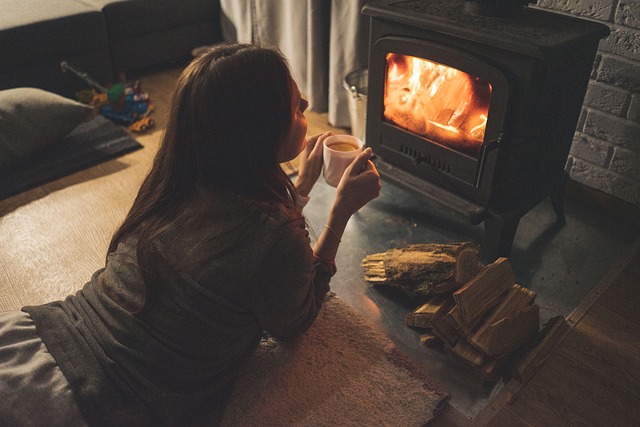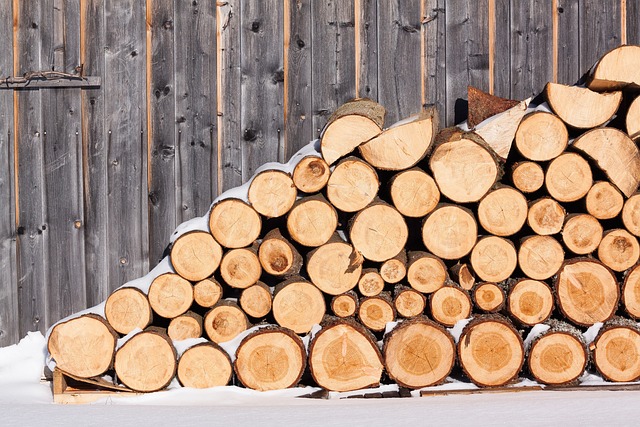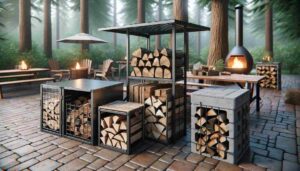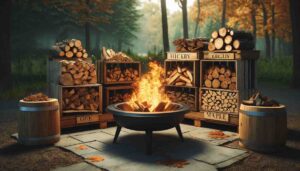Hey there! Have you ever wondered if hickory is the right choice for your fireplace or wood-burning stove? Well, you’ve come to the right place! Today, I’m going to dive deep into the topic of firewood and tackle the burning question: Is hickory good firewood?
The short answer is yes, hickory is considered excellent firewood. It offers superior heat output, long burn time, pleasant aroma, and versatility for various applications like fireplaces, wood stoves, and outdoor fire pits.
When it comes to creating a toasty fire, choosing the right firewood is crucial. It’s not just about aesthetics or convenience; it’s about finding the perfect balance of heat, efficiency, and overall performance. And that’s where hickory comes into play. This popular hardwood has been praised for its qualities as firewood, but is it truly worth the hype? Join me as I explore the ins and outs of hickory as firewood and uncover whether it’s the ideal choice for your needs.
So, let’s get cozy, grab a hot beverage, and embark on this journey to discover the truth about hickory firewood. Trust me, by the end of this article, you’ll have a solid understanding of Hickory’s potential as firewood and be equipped with the knowledge to make an informed decision. Let’s dive in!
What Makes a Good Firewood?
Before I delve into hickory as firewood, let’s first understand what makes good firewood in general. When it comes to selecting the perfect firewood, there are a few key factors to consider. Let’s explore them together:
- Heat Output and Efficiency: The primary purpose of firewood is to produce heat. So, it’s important to choose firewood that has a high heat output. Heat is typically measured in British Thermal Units (BTUs). The higher the BTU value, the more heat the firewood will generate. Look for firewood with a high BTU rating to ensure a warm and cozy fire.
- Density and Long Burn Time: Firewood with higher density tends to burn longer and provide a sustained release of heat. Dense firewood logs are packed with energy and can keep your fire burning steadily for extended periods. This means you won’t have to constantly add new logs to maintain a consistent flame.
- Easy Ignition and Low Smoke: Starting a fire shouldn’t be a daunting task. Opt for firewood that ignites easily and quickly. It saves you time and effort while ensuring a hassle-free fire-starting experience. Additionally, consider firewood with low smoke production to avoid unpleasant odors and excessive smoke filling your space.
Now that you have a good understanding of what makes firewood desirable, let’s dive into hickory firewood and explore its qualities, benefits, and potential drawbacks. Stay with me as we uncover the truth about hickory as firewood.
The Benefits of Using Hickory Firewood
Now, let’s talk about the benefits of using hickory firewood. Hickory, known for its strength and durability, offers several advantages that make it a fantastic choice for your firewood needs. Here are 4 of the key benefits:
- Superior Heat Output: Hickory is renowned for its excellent heat output. It ranks among the top firewood options when it comes to generating warmth. The high BTU value of hickory ensures that it produces a significant amount of heat, making it ideal for those chilly winter nights when you want to cozy up by the fire.
- Long Burn Time: Hickory’s density contributes to its long burn time. With hickory firewood, you can expect a slow and sustained release of heat, allowing you to enjoy a longer-lasting fire. This means you won’t need to constantly replenish the firewood, saving you time and effort in the process.
- Aromatic and Pleasant Smell: Another delightful aspect of hickory firewood is its aromatic and pleasant smell. As it burns, hickory releases a distinctive and inviting fragrance that can enhance the ambiance of your space. The pleasant aroma adds an extra layer of enjoyment to your fire experience, making it even more enjoyable and cozy.
- Versatility in Applications: Hickory firewood is versatile and can be used in various settings. Whether you have a fireplace, a wood stove, an outdoor fire pit, or even for cooking purposes, hickory can meet your needs. Its versatility makes it a valuable option for those who want to use firewood for different purposes around their home.
With its superior heat output, long burn time, pleasant smell, and versatility, hickory firewood offers a range of benefits that can elevate your fire experience to new heights. Now, let’s move on to the next section where I’ll explore a few considerations and potential drawbacks associated with hickory firewood.
Considerations and Potential Drawbacks
While hickory firewood has numerous benefits, it’s essential to consider a few factors and potential drawbacks before committing to it as your primary firewood choice. Let’s explore them together.
- Availability and Cost: Hickory firewood may not be as widely available as some other types of firewood. Depending on your location, it could be challenging to find a consistent supply of hickory logs. Additionally, due to its desirable qualities, hickory firewood may be relatively more expensive compared to other options. It’s worth considering the availability and cost factors when making your decision.
- Density and Difficulty Splitting: Hickory is known for its density, which contributes to its long burn time and heat output. However, this density can also make it challenging to split into manageable-sized logs. You might need more effort, specialized tools, or even professional assistance to split hickory effectively. Keep in mind that dealing with dense firewood can require extra time and physical exertion.
- Intense Heat and Potential Overheating: Hickory’s high heat output, while beneficial in certain situations, can also be a potential drawback. If you have a smaller space or are using hickory in an environment that is sensitive to heat, such as near flammable objects or in a tightly sealed area, you must exercise caution. The intense heat produced by hickory firewood may lead to overheating or create uncomfortable conditions. It’s crucial to manage the fire carefully and use the appropriate amount of hickory to maintain a safe and comfortable environment.

Should you burn hickory in a fireplace?
Absolutely! Hickory can be an excellent choice for burning in a fireplace. Its high heat output and long burn time make it ideal for creating a cozy and warm atmosphere in your home. However, there are a few things to keep in mind when burning hickory in a fireplace:
- Proper Ventilation: Ensure that your fireplace is properly ventilated to allow for efficient combustion and to prevent the buildup of smoke or harmful gases. A well-functioning chimney or flue system is essential for the safe use of any firewood, including hickory.
- Use Seasoned Hickory: It’s crucial to use properly seasoned hickory firewood. Seasoned firewood has been dried for a sufficient period, usually for at least six months to a year, to reduce its moisture content. Burning wet or green wood, including hickory, can result in poor combustion, excessive smoke, and increased creosote buildup in the chimney.
- Check for Local Regulations: Before burning hickory or any other firewood in your fireplace, familiarize yourself with local regulations and any restrictions in your area. Some locations have specific guidelines on the types of firewood that can be burned or restrictions on wood-burning during certain times of the year. Compliance with these regulations ensures both your safety and environmental responsibility.
- Proper Maintenance: Regularly maintain your fireplace, including cleaning the chimney and removing any creosote buildup. This helps ensure proper airflow and reduces the risk of chimney fires.
The radiant heat and pleasant aroma of hickory will create a warm and inviting atmosphere for you to relax and unwind.
Remember, safety should always be a top priority when using any type of firewood in a fireplace. If you have any doubts or concerns, it’s best to consult a professional chimney sweep or fireplace expert who can provide personalized guidance based on your specific setup.
How long does hickory firewood need to season?
Properly seasoning hickory firewood is essential for optimal performance and efficient burning. Seasoning refers to the process of drying the wood to reduce its moisture content. Hickory, like other hardwoods, typically requires a sufficient amount of time to season effectively. The recommended seasoning period for hickory firewood is generally around 6 to 12 months. However, the exact time required can vary depending on several factors:
- Initial Moisture Content: The moisture content of freshly cut hickory firewood can range from 50% to 60% or even higher. The drying process aims to reduce this moisture content to a more ideal level of around 15% to 20%. The higher the initial moisture content, the longer the seasoning period may be.
- Climate and Environment: The climate and environment in which you’re seasoning the hickory firewood can influence the drying time. Dry and warm climates with good airflow facilitate faster drying. On the other hand, humid or cold environments may prolong the seasoning process.
- Wood Splitting and Stacking: Splitting the hickory logs into smaller pieces increases the surface area and exposes more wood to air, promoting faster drying. Properly stacking the split logs in a well-ventilated area, such as in a woodshed or an open-sided structure, also helps facilitate drying.
- Monitoring Moisture Content: To determine if the hickory firewood is adequately seasoned, you can use a moisture meter to measure the moisture content of the wood. When the moisture content reaches around 15% to 20%, it is considered well-seasoned and ready for burning.
It’s important to note that the seasoning time provided is a general guideline, and the actual drying period can vary depending on the specific conditions. It’s always recommended to test the moisture content of the hickory firewood with a moisture meter to ensure it has reached the desired level before using it for burning.
How hard is Hickory to split?
Hickory, being a dense and hardwood species, can be challenging to split compared to some other types of firewood. Its hardness and density make it resistant to splitting forces, requiring more effort and potentially specialized tools for effective splitting. Here are some key factors to consider regarding the difficulty of splitting hickory:
- Density: Hickory is known for its high density, which contributes to its excellent heat output and long burn time. However, this density also means that the wood is harder and more resistant to splitting. The tightly packed fibers and strength of hickory make it a formidable opponent when it comes to splitting.
- Growth Rings and Grain Patterns: The growth rings and grain patterns of hickory can vary, and some pieces may have interlocking or twisted grain, making it more challenging to split along the grain lines. These irregularities in the wood can require additional force and precision when attempting to split it.
- Moisture Content: The moisture content of hickory firewood can also impact its ease of splitting. Green or freshly cut hickory wood will have a higher moisture content, making it tougher to split compared to properly seasoned hickory. Seasoned hickory with a lower moisture content tends to be slightly easier to split.
- Tools and Techniques: To effectively split hickory, you may need to employ appropriate tools and techniques. A heavy-duty splitting maul or a wedge and sledgehammer can provide the necessary force for splitting dense hardwoods like hickory. It’s important to use these tools safely and follow proper splitting techniques to avoid injury.
While hickory can be challenging to split, with the right tools, technique, and a bit of persistence, it is certainly manageable. Taking the time to properly prepare and use the right tools will help you overcome the dense nature of hickory and ensure you have well-split firewood ready for a cozy fire.
If you’re unsure or lack experience in splitting hardwoods, it may be beneficial to seek guidance from an experienced woodcutter or a professional who can provide advice or assistance to make the splitting process easier and safer.
FAQ – Hickory Firewood
In this FAQ section, I will address the most burning questions about hickory firewood.
Q: Is hickory firewood suitable for all types of fireplaces?
A: Yes, hickory firewood can be used in various types of fireplaces, including traditional wood-burning fireplaces, wood stoves, and outdoor fire pits. Just ensure that your fireplace is properly ventilated and compliant with local regulations.
Q: How long does hickory firewood burn?
A: Hickory firewood burns for a long time due to its density. The exact burn time can vary depending on factors such as log size, moisture content, and airflow. Generally, hickory can provide a sustained and long-lasting fire, allowing you to enjoy hours of warmth.
Q: Is hickory firewood expensive?
A: Hickory firewood can be relatively more expensive compared to some other firewood options. Its desirable qualities, such as high heat output and long burn time, contribute to its price. Availability and local market conditions can also influence the cost of hickory firewood.
Q: Can I burn green or unseasoned hickory firewood?
A: It is not recommended to burn green or unseasoned hickory firewood. Green wood has a high moisture content, which can lead to inefficient combustion, excessive smoke, and creosote buildup in the chimney. It is crucial to properly season hickory firewood for optimal burning performance.
Q: Can I mix hickory with other types of firewood?
A: Yes, you can mix hickory with other firewood types to achieve a desired balance of burn characteristics. Hickory pairs well with woods like oak, maple, or ash. Mixing firewood can provide a combination of heat output, burn time, and aroma to suit your preferences.
Q: How should I store hickory firewood?
A: To properly store hickory firewood, ensure it is kept in a well-ventilated area, protected from moisture and the elements. Stack the split logs off the ground, with good airflow between them, and cover the top to prevent excessive moisture accumulation while allowing for continued drying.
Q: Does burning hickory firewood require any special precautions?
A: While hickory firewood is generally safe to burn, its high heat output may require caution in smaller spaces or near flammable materials. Ensure proper ventilation, use appropriate amounts of firewood, and follow fire safety guidelines. Regular maintenance, such as chimney cleaning, is also important for safe and efficient use.
Q: Can I use hickory firewood for cooking?
A: Yes, hickory firewood is often used for cooking due to its aromatic qualities and ability to impart a delicious smoky flavor to food. Hickory is particularly popular for grilling, smoking, or barbecuing meats and other dishes. Ensure the firewood is properly seasoned and free from any chemical treatments before using it for cooking.
Q: Where can I find hickory firewood?
A: Hickory firewood may be available at local firewood suppliers, tree service companies, or specialized firewood retailers. Check online directories, local classifieds, or ask around for recommendations. Availability may vary depending on your location, so it’s advisable to plan ahead and secure a reliable source.
Remember, while the information provided in this article is based on general knowledge, it’s always important to consider your specific circumstances and consult local regulations or professionals for personalized advice.
Conclusion
In conclusion, hickory firewood offers a range of advantages that make it an excellent choice for creating a warm and cozy ambiance. With its superior heat output and long burn time, hickory ensures a sustained and enjoyable fire that will keep you snug during chilly nights. The aromatic and pleasant smell adds an extra touch of charm, enhancing your overall fire experience.
Furthermore, hickory’s versatility allows you to use it in various settings, whether it’s for indoor fireplaces, wood stoves, outdoor fire pits, or even cooking. The dense nature of hickory provides you with reliable heat and performance across different applications.
While there are considerations to keep in mind, such as availability, cost, and the potential challenges of splitting dense hickory wood, the benefits it offers make it worth the extra effort for many firewood enthusiasts.
As you venture forward, armed with this newfound knowledge, take a moment to consider your specific needs and circumstances. Whether you choose hickory or explore other firewood options, the key is to create a comfortable and inviting space that brings warmth and joy.
I hope this guide has ignited your passion for firewood and kindled a deeper appreciation for the wonders of hickory. Remember to prioritize safety, follow local regulations, and maintain your fireplace and chimney regularly for optimal performance.
Thank you for joining me on this journey, and may your future fires with hickory firewood be filled with warmth, relaxation, and cherished moments. Stay cozy, my friends!
Related: Is Sycamore Good Firewood? Here’s What You Need To Know










